Archives
-
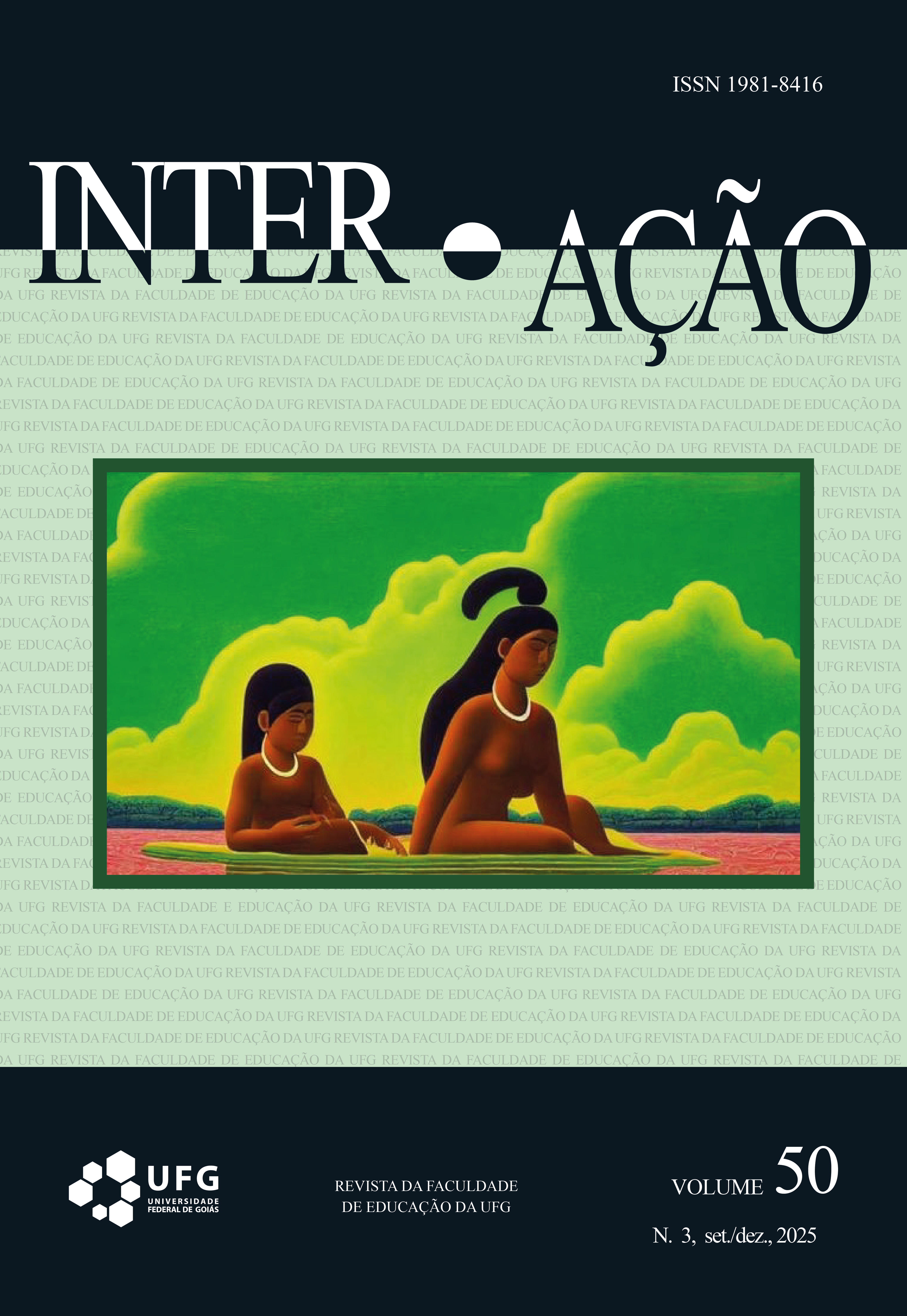
V. 50, N. 3, 2025 - Temas com foco no escopo da Revista Inter-Ação
Vol. 50 No. 3 (2025)Our issue, in its first section, presents articles that focus on gender issues, the second section addresses indigenous and quilombola themes in the Amazon region, and the third section presents environmental issues as its central theme. The fourth section follows the disputes surrounding special education in Brazil, the theme of inequalities connects the fifth section, and incarceration and the militarization of education bring together our sixth section. In the field of current educational policies, educational reforms have been the subject of much research and study. Our seventh section brings together articles on this topic. The theme of teacher training and health is the focus of the eighth section. Finally, our ninth and final section brings together articles on different themes: adolescence, cinema, children's literature, curriculum, and Paulo Freire.
-
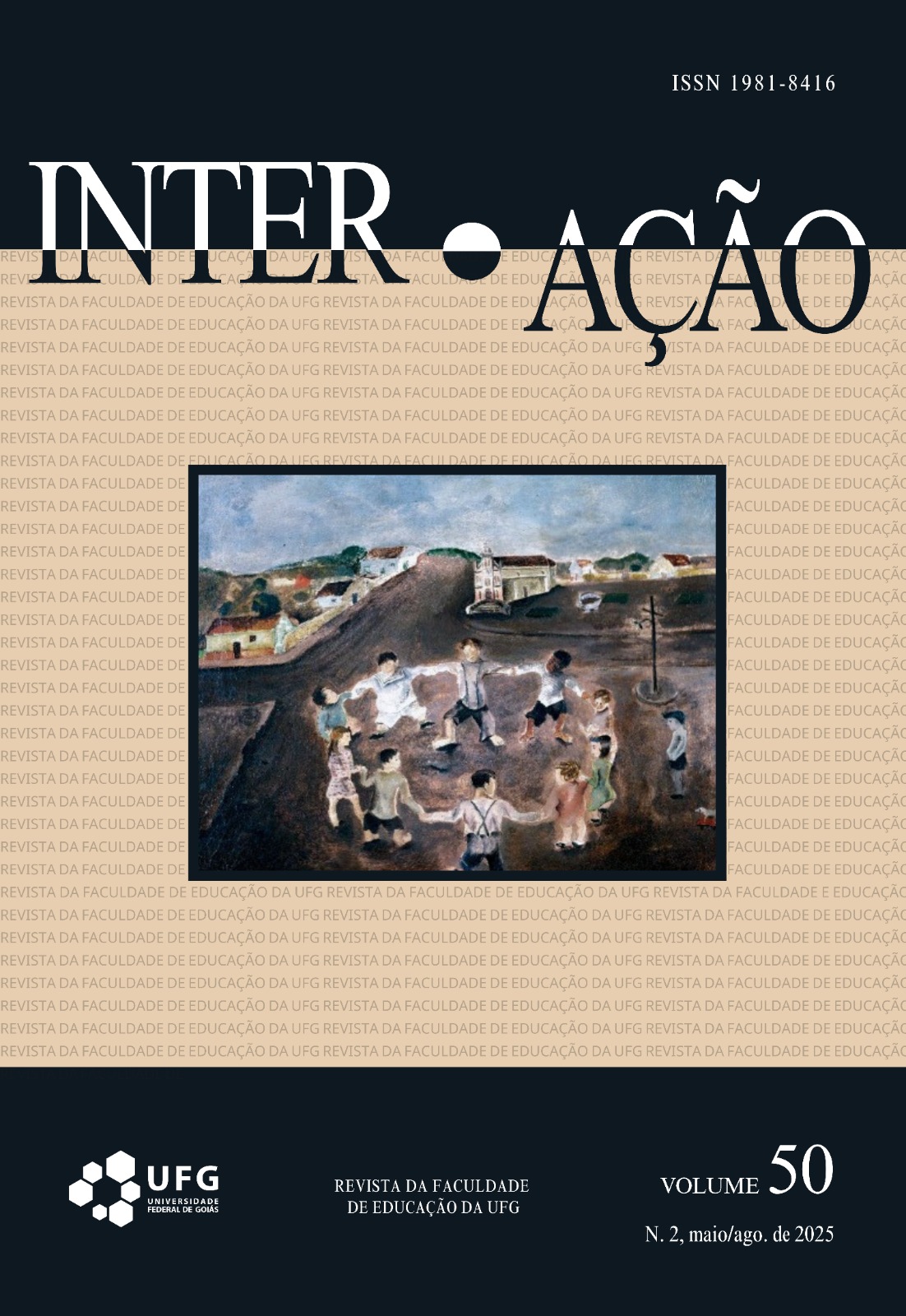
V. 50, N. 2, 2025 - Temas com foco no escopo da Revista Inter-Ação
Vol. 50 No. 2 (2025)We have carefully curated this second issue of our journal for you, our readers! It is dedicated to discussing youth and adult education, early childhood education, teaching experiences and training, educational fundamentals, education and technology, inclusive education, and higher education. The articles are organized into eight sections.
-
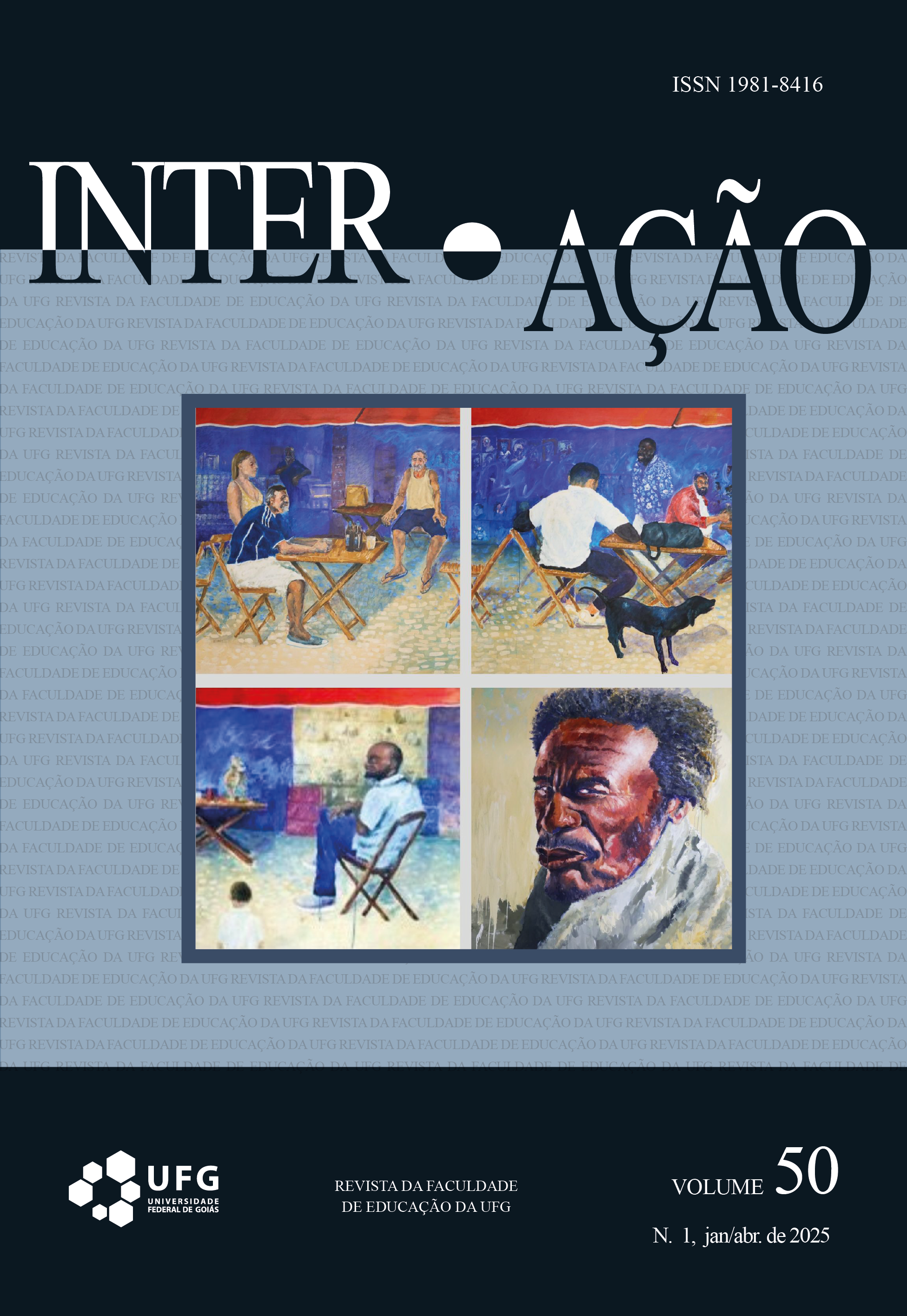
V. 50, N. 1, 2025 - Temas com foco no escopo da Revista Inter-Ação
Vol. 50 No. 1 (2025)Este primeiro número da Revista apresenta uma diversidade de artigos que contribui com os debates da educação nesse momento. Além disso, os 28 artigos advêm de quatro regiões do país, a saber: Centro-Oeste, Nordeste, Sudeste e Sul, além de um artigo de Portugal. A maioria dos artigos conta com autoria de pessoas vinculadas às instituições públicas de educação superior (IES), sendo 14 de IES federais e 7 estaduais. Três publicações são de IES privadas. Em sua maioria os artigos abordam a educação superior, mas também temos artigos que abordam a educação básica, as questões de metodologia e currículo, educação especial e educação profissional técnica.
-
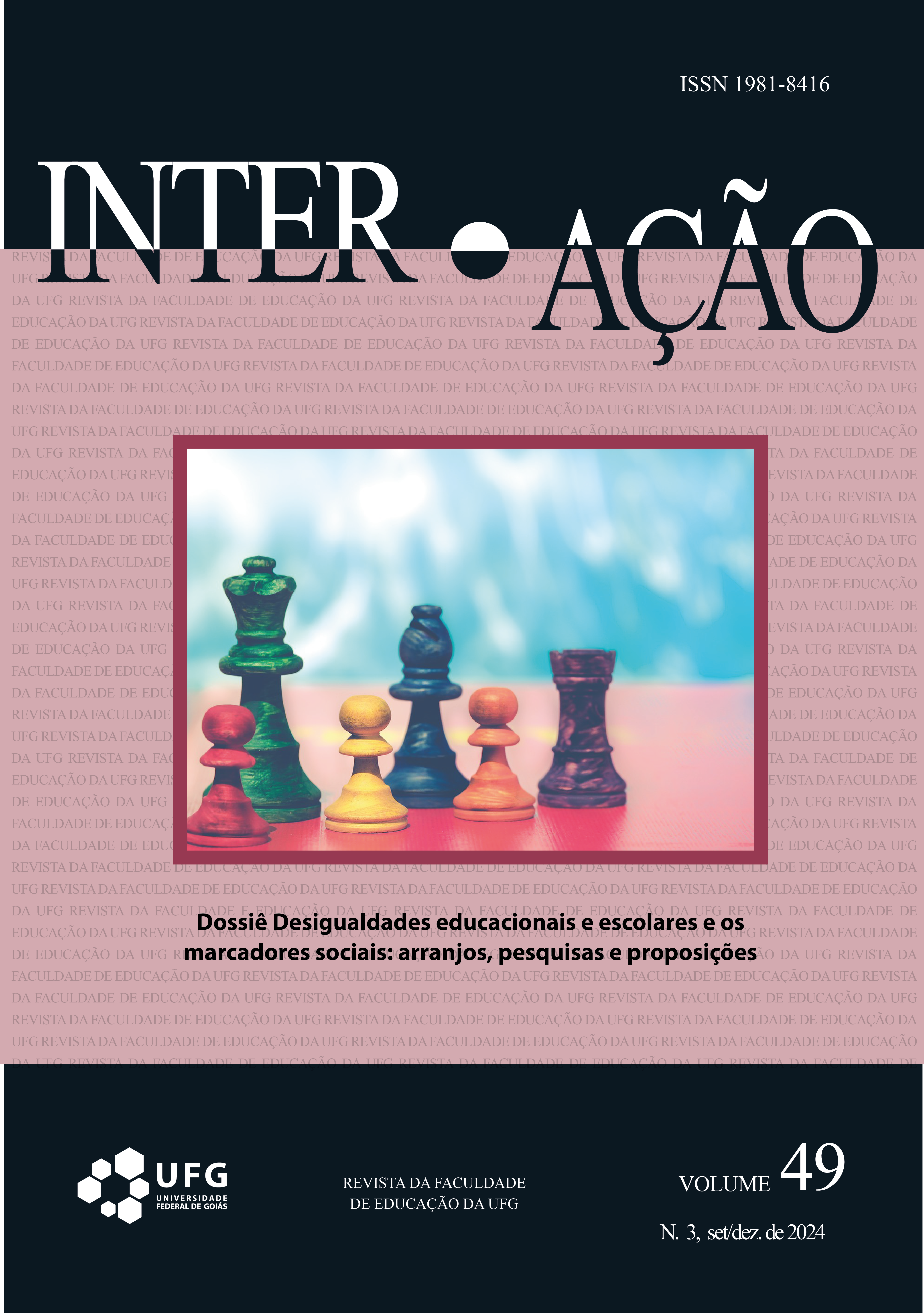
Dossiê Desigualdades educacionais e escolares e os marcadores sociais: arranjos, pesquisas e proposições
Vol. 49 No. 3 (2024)Este dossiê se justifica por enfocar um tema que ocupa a agenda de pesquisadores de vários campos, uma vez que a configuração e a imbricação com os marcadores sociais, por meio da articulação e assimetrias de diferentes abordagens e perspectivas é um campo fecundo para se discutir a desigualdade educacional e escolar, especialmente após a pandemia do SARS COVID-19. Ou seja, o dossiê busca fomentar a discussão acerca da desigualdade educacional e escolar em relação, diálogo, assimetria ou interseção com os marcadores sociais raça/cor, gênero, nível socioeconômico, território, pessoa com deficiência – bem como novas formas de discriminação presentes nos diferentes contextos educacionais e escolares. Para tal, encorajamos a submissão de estudos de natureza teóricos, metodológica e análises empíricas que apresentem as configurações, delineamentos, invisibilidade de indivíduos, entre outros, a partir de distintas perspectivas, cenários, contextos e territórios em que a desigualdade se materialize. Além disso, os estudos podem apresentar uma vertente interdisciplinar e transversal que contemplem os aspectos históricos, sociais, econômicos, culturais e políticos relacionados à desigualdade educacional e escolar.
-
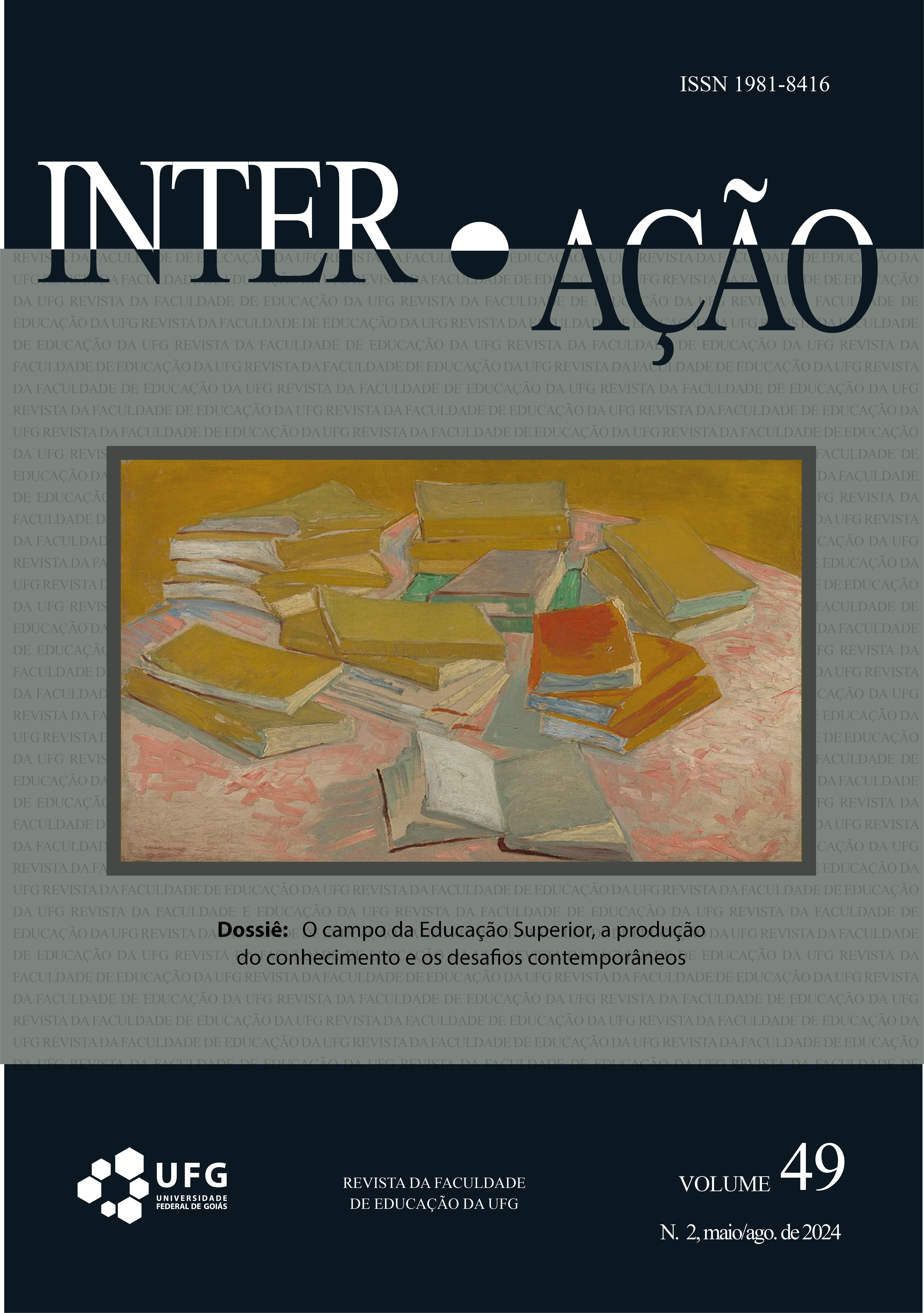
HIGHER EDUCATION, KNOWLEDGE PRODUCTION, AND CONTEMPORARY CHALLENGES
Vol. 49 No. 2 (2024)The first words of any text are always a source of doubt for the writer. It's no different for a dossier presentation. Even though, as it is well known in university atmosphere and in other social fields, the first thing to do after a gift, an exchange, dedicated attention, or any other act of special care or disinterested purpose (a disinterested act in the Gramscian sense) is to say thank you. But the first question remains: how do we thank so many people for their support, services, and donations? Especially after having received the selfless trust of so many people, and institutions involved in this publishing project.
So, at the risk of not being grateful enough and not realizing to whom we owe our gratitude, we would first like to thank Axis 6 of the Universitas/BR network for appointing us as representatives of the researchers’ group for the organization of this dossier. Secondly, we would like to thank the editorial staff of Revista Inter-Ação for accepting our dossier proposal, and the administrative editor, Rodrigo Gouvêa Rodrigues, for his generous attention and for all the technical work required to carry out our tasks. In particular, we would like to thank the authors who provided us with their scientific creations to be published in this dossier and the reviewers who took on the workload of preparing rich and careful assessment and evaluation reports. Finally, we would like to thank the academic institutions and public funding agencies that have provided all kinds of support to the authors in their research, as well as Revista Inter-Ação, which in the case of this dossier has been and continues to be a primary vehicle for the communication of research results.
This collection of articles aimed to explore the complex relationships between the production of knowledge, the field of higher education, and how educational policies are regulated. In this context, we had publicly invited researchers to contribute with articles that address these issues, which are fundamental to higher education, academic research, educational policies, and their impact on the production and dissemination of knowledge.
As it is known, higher education is facing significant challenges in the contemporary world. Therefore, understanding the dynamics of knowledge production and the regulation of educational policies is essential for the formulation of country strategies and projects. This dossier, as each reader will see, has sought to deepen the discussion on key issues in higher education and scientific production.
Higher education is essential for economic, social, and cultural development, but it is under increasing pressure from globalization, the demands of capitalism, technological advances, social, political, economic, and cultural crises and changes. In this context, educational policies represent regulations and determinations in the space of provision in higher education, including public and private higher education institutions (HEIs).
Moreover, the production of knowledge in universities plays a fundamental role in the construction of knowledge and scientific progress in society. Therefore, understanding how public policies affect academic research and higher education is essential to ensure that higher education institutions can fulfill their missions, which are enshrined in the Constitution of the Federative Republic of Brazil.
In line with the theme of the dossier, "Higher education, knowledge production, and contemporary challenges", the articles brought contributions on a variety of topics, including "An Approach to the International Panorama of Public Higher Education in Chiapas/Mexico", by Egeslaine de Nez and Diana Jiménez; "World-Class Universities in The USA and Brazil: Union Resistance to the Model", by Moisés Mazza, Aryanne Oliveira, and Savana Melo; "International Academic Rankings as Regulators of Higher Education: An Examination of How They are Utilized in Institutional Policy Decision-Making", by André Martins and Gladys Barreyro; "Internationalization in the Wake of the Postgraduate Regulatory Assessment in Brazil", by Edineide Jezine and Wlly Barbosa; "Internationalization of Undergraduate Courses and the Educational Policy for Refugees: Analysis of the Emergency Academic Solidarity Program – PESA", by Rômulo de Azevedo and João de Oliveira; "Academic Capitalism and the Alienating Competition Between Teacher-Researchers in Higher Education Rankings", by Everton Fargoni, João Júnior and Afrânio Catani; and "Scientific Cooperation in the Global South: Towards an Alternative Internationalization”, by Juliana Souza, José Cossa and Cibele Rodrigues.
It is worth noting that, apart from the fact that the authors of this dossier are associated with higher education institutions located in three different regions of the country, namely the Federal University of Rio Grande do Norte (UFRN)/Federal University of Paraíba (UFPB), in the Northeast; the Federal University of São Carlos (UFSCar), in the Southeast; and the State University of Maringá (UEM), in the South, the authorship of the articles reveals the same regional diversity as the topics covered.
Something that is worth repeating, reflects the same diversity as the Universitas/BR Network and Axis 6 of this network, called "New modes of regulation and trends under construction in the field of knowledge production", which aims to:
- Study the policies and actions in the Brazilian university sector, in the areas of undergraduate and postgraduate studies, ST&I, and knowledge production, in order to understand the logic and trends underway;
- Map and analyse the regulatory modes (international, national, and local) and legal frameworks that shape the processes, mechanisms, and actions in the field of academic-scientific knowledge production;
- Analyze institutional, organizational, and teaching practices in the field of knowledge production as a result of the new modes of regulation and current policies;
- Analyze the production of knowledge in Brazil, taking into account the emergence of a new type of knowledge originating from the globalized economy, its interfaces with global corporations and financial funds, through the study of Brazilian scientific production and its financing;
- Examine the consequences for the management and evaluation of research and postgraduate studies, considering the possible changes in the habitus and modus operandi of the scientific-academic field in the context of the globalization of higher education.
To illustrate this, it should be noted in this presentation that the Universitas/Br Network, to which Axis 6 is linked, is characterized as an academic network that includes researchers, many of whom have received CNPq funding and grants, from different higher education institutions in all regions of the country, and was born within the Working Group (WG-11) "Higher Education Policies" of the National Association for Postgraduate Studies and Research in Education (ANPEd).
The Universitas/BR Network has been structured since the beginning of the 1990s, based on integrated academic research projects, which have led to seminars, joint publications, the formation of research groups, nuclei, and directories, the creation of research lines in postgraduate programs and the training of students in the context of scientific initiation and master's, doctoral and postdoctoral courses directly linked to the researchers of the network (http://www.redeuniversitas.com.br/).
In this way, this dossier is related to the scope of Revista Inter-Ação in a pertinent and relevant way, as it can be seen by reading the articles, and we hope that it can contribute to the advancement of knowledge and debate in the field of education, especially higher education.
Finally, we would like to emphasize that the authorship of this dossier was not limited to Axis 6 of the Universitas/BR Network. Our call resulted in the submission of 80 (eighty) articles, of which 19 were accepted for publication, coming, as already mentioned, from different regions of Brazil and abroad.
We wish you a pleasant and inspiring reading of the articles in this dossier.
Alda Maria Duarte Araújo Castro
Federal University of Rio Grande do Norte (UFRN) and Visiting Professor at the Federal University of Paraíba (UFPB).
José Carlos Rothen
Federal University of São Carlos (UFSCar).
Mário Luiz Neves de Azevedo
State University of Maringá (UEM).
Dossier organizers on behalf of Axis 6 of the Universitas/BR Network.
Rodrigo Gouvêa Rodrigues
Federal University of Goiás (UFG) and Administrative Editor of Revista Inter-Ação.
Translator of the Presentation (English and Spanish).
Goiânia/GO, september, 2024.










